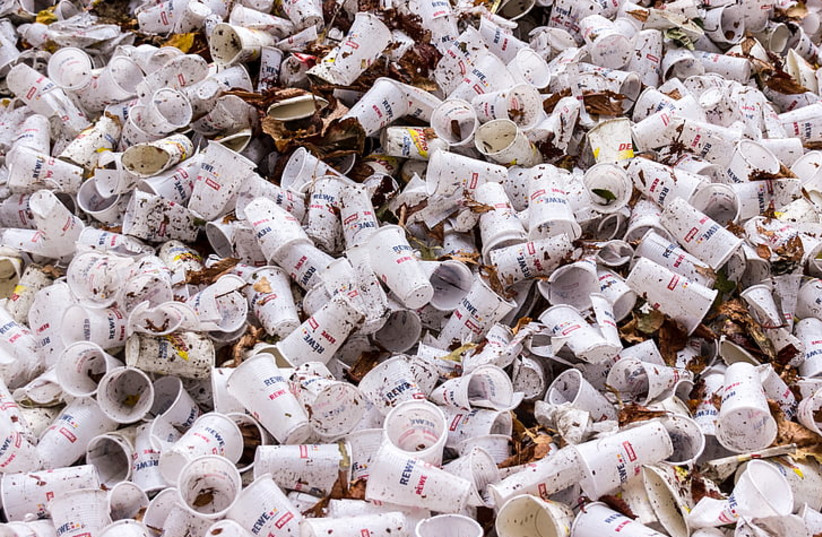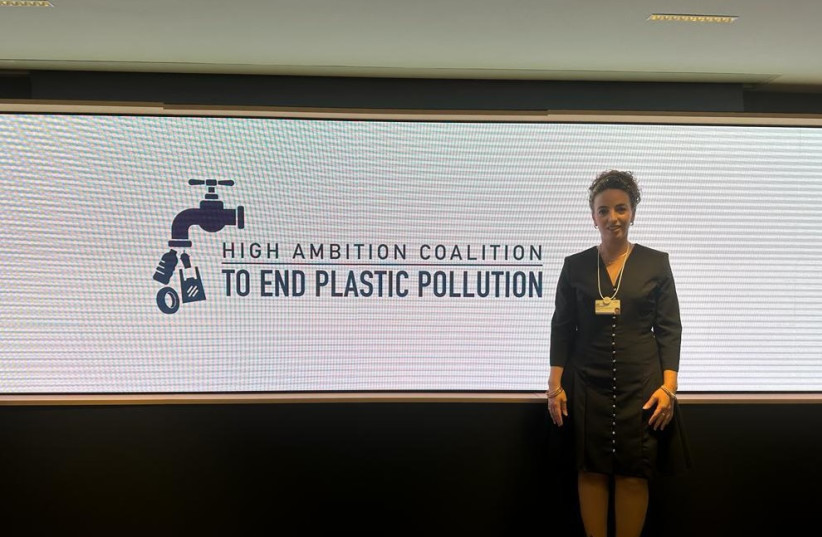Israel’s environmental minister at UN, pledges to combat plastic pollution
Less than a year after the Israeli government scrapped the tax on single-use items, which could have been instrumental in curbing plastic pollution, the nation has now aligned itself with an international coalition dedicated to combating plastic pollution.
Environmental Protection Minister Idit Silman, in New York for the United Nations General Assembly, declared this week that Israel had officially joined the UN efforts to establish a binding global treaty by 2024 to eradicate plastic pollution and that the country would sign it upon completion. This treaty will encompass all aspects of the plastic life-cycle, from production and design to disposal, primarily focusing on minimizing pollution, averting plastic-related contamination, and safeguarding public health.
“Changing habits is difficult, but we must do it – both in reducing plastic use and preventing littering in open spaces,” Silman said. “By combining forces and creating a new and effective international treaty, we can establish regulatory and economic systems that will push the market to stop using single-use plastics.
“Israel needs to be part of the global consensus to reduce plastic,” she said.
Silman attended the meeting on the treaty with her director-general, Guy Samet.
In response to Israel’s announcement, environmental activists pushed back, calling the move a blatant contradiction.

“On one hand, the Israeli government abolished the tax on single-use items, and the minister did not speak out in protest,” said Amit Barak of the NGO Adam, Teva, V’Din – Israel Union for Environmental Defense. “On the other hand, Israel signed a non-binding international agreement… This inconsistency does not bode well for us.”
Israel ranks among the top OECD countries in terms of single-use plastics usage. Silman’s office emphasized that Israel’s decision to join the treaty signifies a commitment to bolster its domestic initiatives to combat plastic pollution while gaining international recognition for these efforts.
The Environmental Protection Ministry is actively exploring a range of policy measures to combat single-use plastic pollution. These initiatives encompass source reduction, educational campaigns, curbing the distribution of single-use products within institutional markets, minimizing the use of such items in environmentally sensitive regions, expanding regulations associated with plastic bags to decrease their usage further, and additional strategies. In pursuit of these goals, the ministry is engaged in discussions with relevant departments in the Finance and Economy ministries. Upon concluding this comprehensive effort, the ministry hopes to present a well-defined operational plan.
Furthermore, in collaboration with the Nature and Parks Authority, the ministry is actively advocating for regulations to forbid bringing single-use plastic items into Israel’s national parks.
Other nations following Israel’s same path
Israel is not alone in its use of plastic. According to a 2022 OECD report, global plastic waste production has doubled over the past two decades and quadrupled over the past 30 years, with most of this waste finding its way into landfills, undergoing incineration, or seeping into the natural environment.
The OECD report said that plastics account for 3.4% of global greenhouse gas emissions.
Nearly half (40%) of plastic waste comes from packaging, 12% from consumer goods and 11% from clothing and textiles. Only 9% of plastic waste is recycled, according to the report.

In addition to the plastic treaty, Silman also participated in a high-level meeting of the 30×30 Coalition for Biodiversity Conservation. She said Israel is finalizing a national plan for biodiversity conservation, which it plans to publish ahead of the United Nations Climate Change Conference, COP28, in Dubai beginning November 30.
Israel signed the Convention on Biological Diversity in 2021, along with more than 120 other countries, committing to advance the protection of at least 30% of the total area of terrestrial and marine ecosystems globally by 2030. Israel will allocate more than NIS 50 million for activities aimed at nature conservation, Silman said in New York.
To date, while Israel has made steady progress in achieving the 30% conservation target on land, the situation in the marine environment needs to be improved.





Comments are closed.